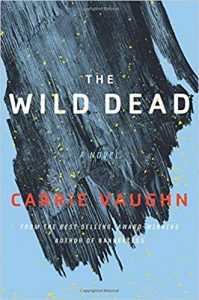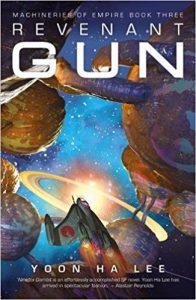2018 in Review by Liz Bourke

Looking back on 2018, the year feels rather longer than mere chronological time can account for. I don’t imagine I can remember all the books I’ve read this year – a year in which I became engaged, hunted for a house, moved house, and most recently, acquired a pair of very boisterous bouncy kittens: the mere quotidian logistics of living have absorbed rather more of my energy and memory than has been the case in any previous year that I can recall.
If you remember my year-in-review piece from last year (I don’t expect you do; I had to dig it out to reread it myself), you’ll remember that what stood out for me in 2017 was the prominence of queer characters and queer relationships in fiction: relationships and characters where, if tragedy exists, it’s a tragedy unrelated to the queerness of those characters and those relationships. This year, I find that even more true than last year. Watching science fiction and fantasy build on some hard-won progress in at least one respect has been a solace and a comfort to me.
I’ve never liked playing favourites with books. I say that all the time. And yet, I do have a favourite book from 2018, a story that feels like it was written to fill a hole in my heart. That story is Aliette de Bodard’s In the Vanishers’ Palace, a short novel set in a fantasy world strongly influenced by Vietnamese history and culture, and by Beauty and the Beast. The world was changed and poisoned and filled with diseases by a magically powerful, alien colonial race who then vanished – the “Vanishers” of the title – and in the present, life is precarious, full of danger. When Yên, a failed scholar, is traded to a dragon, Vu Côn, by her village in payment for the healing of the village headwoman’s daughter, she expects to die: everyone knows that spirits are powerful and capricious, and that dragons kill. Instead, Vu Côn takes Yên as a teacher to Vu Côn’s two headstrong adolescent children, and Yên slowly discovers that there’s more to Vu Côn’s life and choices than she’d previously thought. The world remains full of danger and terror, and both Yên and Vu Côn have to decide where their duty lies, and if there’s any ethical, reasonable way that they can act on their growing desire for each other.
Unlike many fantasy novels, and unlike the fairytale that forms part of its inspiration, In the Vanishers’ Palace is a novel that includes the importance of parental relationships, and in particular mother-child relationships. Filial piety and filial duty – and the challenges of raising children in an imperfect world – are among the novel’s themes. It’s gorgeously written, with precise, telling prose. Its characters are deeply compelling, and it’s structured so that every beat of its story hits me right on an emotional peak. In In the Vanishers’ Palace, de Bodard has written a story that I can’t help but adore, and there’s very little else from 2018 that quite lives up to this storytelling zenith – though I’ll take a short tour through the other novels and novellas that really struck me.
Carrie Vaughn’s The Wild Dead is a quiet and surprisingly gentle post-apocalyptic novel, the second volume to follow the same character after Bannerless. It’s a murder mystery, set in an isolated and marginal community, but one linked into a strong set of social systems and norms due to their participation in a local political – “commune” is probably the closest word. Strongly characterised, with thoughtful worldbuilding, a gorgeous voice, and a deep thematic interest in reproductive issues, sustainability, and community margins, it’s a striking novel, and a memorable one.
 K Arsenault Rivera’s The Phoenix Empress, sequel to The Tiger’s Daughter, is another striking and memorable novel. Where The Tiger’s Daughter was an epistolary epic fantasy, and the beginning of an epic romance, The Phoenix Empress is a tale partly told by one character directly to another, of what has occurred during their separation, with interludes in the present day. The epic nature of The Tiger’s Daughter‘s fantasy and romance grows even more epic in this volume – the protagonists are remarkably dramatic, colourful characters, whose temporary happiness with each other is threatened by the dire promises of fate, of death, and the likelihood that in order to fight a demon, they shall have to abandon their mortal existence and become gods. The Phoenix Empress doesn’t hesitate to deploy the full scope and sweep of epic fantasy, but at its heart, it’s most concerned with the relationship between two young women, their loyalty to each other, and the consequences of their choices. I deeply enjoyed it, and I look forward to the story’s culmination in 2019.
K Arsenault Rivera’s The Phoenix Empress, sequel to The Tiger’s Daughter, is another striking and memorable novel. Where The Tiger’s Daughter was an epistolary epic fantasy, and the beginning of an epic romance, The Phoenix Empress is a tale partly told by one character directly to another, of what has occurred during their separation, with interludes in the present day. The epic nature of The Tiger’s Daughter‘s fantasy and romance grows even more epic in this volume – the protagonists are remarkably dramatic, colourful characters, whose temporary happiness with each other is threatened by the dire promises of fate, of death, and the likelihood that in order to fight a demon, they shall have to abandon their mortal existence and become gods. The Phoenix Empress doesn’t hesitate to deploy the full scope and sweep of epic fantasy, but at its heart, it’s most concerned with the relationship between two young women, their loyalty to each other, and the consequences of their choices. I deeply enjoyed it, and I look forward to the story’s culmination in 2019.
Natasha Ngan’s Girls of Paper and Fire is a striking novel of palace intrigue, romance, and rebellion. In a world divided into castes, where the higher castes have more spirit-like attributes – with, for example, the forms of animals – the lowest caste is the entirely human-form Paper Caste. Every year ten young women from the Paper Caste are selected to become the emperor’s concubines, trained to serve him and forbidden to make any other sexual or romantic connections. Their lives belong to him, and he may dispose of them as he pleases. But Lei doesn’t want to be one of the emperor’s Paper Girls – and when she falls in love with another of the Paper Girls, she finds herself caught up in intrigue and revolution that may cost her her life, if not more. A striking and powerful novel, full of tension, with interesting worldbuilding, it ends on a cliffhanger. I recommend it, but only to those who can stand waiting to find out what happens next!
The Black God’s Drums by P. Djèlí Clark is a brief and excellent novella set in a New Orleans in a world where the Haitian revolution resulted in rather more power for the new Haitian state than it did in the historical world, where the US’s civil war has continued for some years beyond its historical end, and where airships and African gods rub shoulders. A street child called Creeper stumbles into the middle of a conspiracy that threatens her city, and even more. Told with humour, verve, and distractingly good prose, The Black God’s Drums is one of the best novellas of 2018, and certainly one of my favourites.
 I should mention, briefly, several other notable works from 2018 which I’ve read: Elizabeth Bear’s striking novella Stone Mad, sequel to Karen Memory; Kate Heartfield’s weird and compelling medieval historical fantasy Armed in Her Fashion; Jacqueline Carey’s astounding epic fantasy Starless; Melissa Caruso’s deeply engaging Venetian-esque fantasy The Defiant Heir; T. Kingfisher’s sword-and-sorcery fantasy romance Swordheart; Ruthanna Emrys’s cool and measured Lovecraftian Deep Roots; Tim Pratt’s enormously fun space opera The Dreaming Stars; Melissa Scott’s entertaining return to solo space opera in Finders; R.E. Stearns’s piratical science fiction with weird AI in Mutiny at Vesta; and Yoon Ha Lee’s triumphant conclusion to his hexarchate trilogy in Revenant Gun. 2018 was an excellent year for books, for there are many others that I would, if it didn’t seem excessive, draw to your attention.
I should mention, briefly, several other notable works from 2018 which I’ve read: Elizabeth Bear’s striking novella Stone Mad, sequel to Karen Memory; Kate Heartfield’s weird and compelling medieval historical fantasy Armed in Her Fashion; Jacqueline Carey’s astounding epic fantasy Starless; Melissa Caruso’s deeply engaging Venetian-esque fantasy The Defiant Heir; T. Kingfisher’s sword-and-sorcery fantasy romance Swordheart; Ruthanna Emrys’s cool and measured Lovecraftian Deep Roots; Tim Pratt’s enormously fun space opera The Dreaming Stars; Melissa Scott’s entertaining return to solo space opera in Finders; R.E. Stearns’s piratical science fiction with weird AI in Mutiny at Vesta; and Yoon Ha Lee’s triumphant conclusion to his hexarchate trilogy in Revenant Gun. 2018 was an excellent year for books, for there are many others that I would, if it didn’t seem excessive, draw to your attention.
It’s difficult to divine trends when so many books are published in a year – even in a genre like speculative fiction. Even when I read 200 volumes a year, my ability to find patterns in what I’ve read is limited by my existing biases. And yet it feels that I’m reading more and more books that make space for diverse and varied alternate worlds, inclusive and hopeful (in some ways, even if not in all ways) futures. These are enjoyable literary developments, and ones that I strongly hope to see continue.
Liz Bourke is a cranky queer person who reads books. She holds a Ph.D in Classics from Trinity College, Dublin. Her first book, Sleeping With Monsters, a collection of reviews and criticism, is out now from Aqueduct Press. Find her at her blog, her Patreon, or Twitter. She supports the work of the Irish Refugee Council and the Abortion Rights Campaign.
This and more like it in the February 2019 issue of Locus.
 While you are here, please take a moment to support Locus with a one-time or recurring donation. We rely on reader donations to keep the magazine and site going, and would like to keep the site paywall free, but WE NEED YOUR FINANCIAL SUPPORT to continue quality coverage of the science fiction and fantasy field.
While you are here, please take a moment to support Locus with a one-time or recurring donation. We rely on reader donations to keep the magazine and site going, and would like to keep the site paywall free, but WE NEED YOUR FINANCIAL SUPPORT to continue quality coverage of the science fiction and fantasy field.







